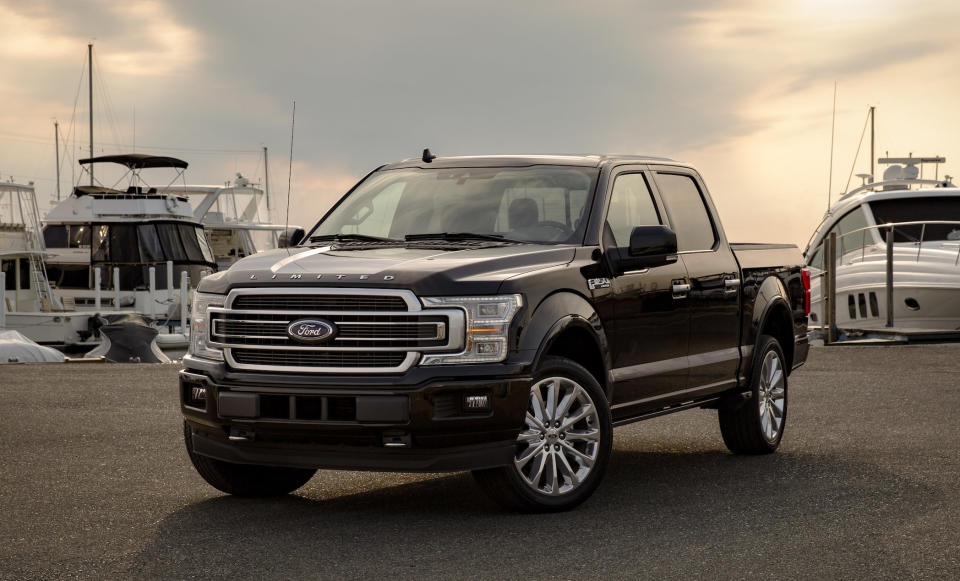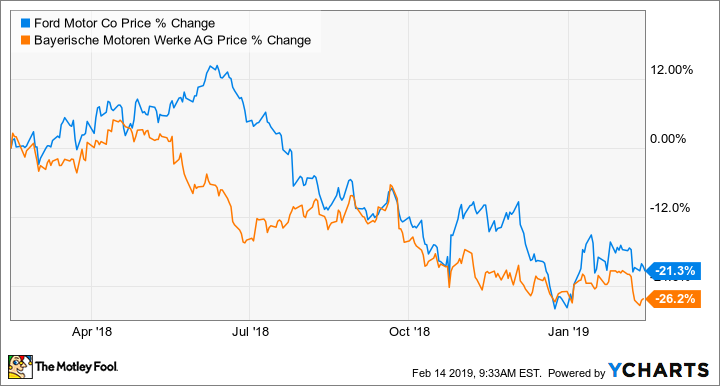Better Buy: Ford Motor vs. BMW AG
Auto stocks had a rough 2018. New-car sales have softened in key markets around the world, and most automakers reported that their 2018 earnings declined year over year. Because automakers have high fixed costs, a small decline in sales can have an outsized impact on their bottom lines. Many auto stocks are now trading at levels suggesting that investors think auto sales may decline further before they start to improve.
Whenever an industry falls out of favor with investors, there are usually bargains to be found -- the good companies that were sold off with the bad ones. Ford Motor Company (NYSE: F) and BMW AG (NASDAQOTH: BMWYY) were investor favorites a few years ago, when their sales (and earnings) were rising and their management teams looked a bit sharper than most. But both have slumped over the last year.
There are lots of reasons to think that both Ford and BMW are still good, well-run companies. But which is the better buy right now? Let's take a look.

Ford's profit story begins with its huge-selling F-Series pickups. Sales have been strong, helping Ford fund changes in other parts of its business. Image source: Ford Motor Company.
How Ford and BMW compare on valuation and stock performance
Both Ford and BMW have had a tough year in the stock market. But U.S. investors, who have probably heard a lot about Ford's slump, might be surprised to learn that BMW's stock price has lost even more of its value than Ford's over the last 12 months.
F data by YCharts. The chart shows the percentage change in the stocks of Ford and BMW over the year ended February 13, 2019.
When we look at valuation measures based on earnings, both companies look pretty cheap. Automakers have historically traded around 10 times earnings when times are good, but both are well below that level. Right now, BMW is trading at about 5.7 times its earnings over the last 12 months, while Ford is trading at around 6.5 times its adjusted earnings over the same period.
(Why adjusted earnings for Ford? Ford had a big non-cash accounting charge in the fourth quarter of 2018, related to its pension funds; adjusted earnings exclude that charge. If we include the charge, Ford's price-to-earnings ratio is a bit over 9, which seems a bit misleading. In this case, adjusted earnings give us a better view of Ford's actual valuation.)
Note that both look a little more fully valued when we look ahead, as Wall Street analysts expect earnings for both to fall in the coming year. BMW is trading at about 6.6 times its expected 2019 earnings, while Ford is priced at about 6.9 times its expected 2019 result. Both still look cheap, but not quite as cheap.
Ford and BMW both pay good dividends, but one stands out
Both companies have paid strong dividends in recent years that look even stronger now that their stock prices have slumped. Based on dividends paid over the last year, BMW's dividend yield is currently 5.8%, while Ford's is a stout 7.2%.
If we could count on those dividends being paid at those levels through a recession, either would be a nice choice to buy and reinvest in through the next down cycle, whenever it arrives. However, note that BMW and Ford have taken different approaches to determining, paying, and increasing their dividends.
BMW determines and pays its dividend once a year, generally in May, after its board of directors reviews the prior year's results. BMW has increased its dividend every year since 2010, from just 0.30 euros (reflecting a difficult 2009) to 4.00 euros in May of 2018, following a successful 2017.
Given its past practice, we should assume that BMW won't sustain that level of dividend payments when its earnings fall, as they're expected to in 2019 -- and as they will in the next recession, whenever it arrives.

BMW built its brand on zippy luxury-sports sedans. But in recent years, its SUVs have become big contributors to the bottom line. Image source: BMW AG.
Ford, on the other hand, pays a quarterly dividend that it has held steady (at $0.15 per quarter) since 2015. In 2016, 2017, and 2018, it chose to pay an additional "supplemental" dividend early in the year, while holding its regular quarterly dividend steady.
Why would it do that instead of increasing the regular dividend? Because Ford wants shareholders to be able to count on that regular quarterly dividend, so the company holds it at a level it feels it can maintain. The company has said repeatedly (and emphatically) that it is prepared to maintain steady quarterly dividend payments "through the cycle," meaning through a recession -- and that it intends to do so to demonstrate that its dividend is reliable.
Given Ford's hefty cash hoard ($23.1 billion as of December 31, 2018) and the steady stream of cash generated by its captive-financing arm, it's a credible plan.
Growth and potential risk
Both BMW and Ford are mature industrial giants in a cyclical industry, meaning their sales and profits will rise and fall with consumer confidence, closely tracking the economic cycle. For automakers generally, success involves maximizing profit while times are good, while holding down costs (and building a cash reserve) so they're able to continue investing in future products through recessions when profits are thin.
While auto sales globally have remained strong, automakers' profits have begun to slip, suggesting that the current cycle is closer to its end than to its beginning. Both Ford and BMW are working to stay ahead of the cycle, reducing costs now while sales are still good and investing in future products and technologies.
Ford and BMW, like most of their global rivals, are facing another challenge now: future technologies. Electrification, self-driving, and new models of personal mobility are expected to bring drastic changes to the auto industry over the next several years. The big automakers that have dominated the business for the last century will have to adapt in order to continue to thrive and profit, and both BMW and Ford are making big investments and organizational changes now in anticipation of that.
BMW is developing a self-driving system with a group of partners, including Intel, Aptiv, and Fiat Chrysler Automobiles, among others. BMW expects to launch its first vehicle with autonomous capabilities in about two years. Separately, it is developing new vehicle architectures that will allow it to build internal-combustion, hybrid, and full battery-electric variants of each of its principal models -- all on the same assembly line, in proportions that can be varied to meet demand as it shifts over time. Its first long-range electric vehicle, a battery-electric version of its X3 crossover SUV, is expected next year.
BMW has been adding high-margin (internal combustion) SUVs to its product line to help fund those future-tech investments, but it has warned that the new models may only partially offset its increased spending, meaning its margins will likely be squeezed for the next few years.
Ford is also working on a line of electric vehicles, with the first -- a high-performance SUV -- also set to arrive in 2020. But it's taking a different approach to self-driving: Ford took a big stake in an autonomous-vehicle start-up, Argo AI, and essentially deputized the start-up to drive the software side of its in-house development effort. Like BMW, Ford expects to launch a self-driving vehicle in 2021. But Ford's self-driving vehicle will play to its own strengths: It will be aimed at commercial-fleet applications.
Ford CEO Jim Hackett has also begun restructuring the company itself, streamlining processes to reduce development times and make Ford more able to adapt to market changes quickly. He is also revamping Ford's global product line, reducing spending on low-margin products (sedans) while developing new higher-margin SUVs and commercial vehicles in a bid to boost Ford's margins to ensure that it can make these aggressive future-tech investments.
All together, Ford expects its effort will cost $11 billion over the next three to five years, but it will pay off with fatter margins in time.
Is Ford or BMW the better buy today?
You've probably guessed by now that I like both companies as long-term investments. If you hold either, and can afford to be patient, hang on. But I like Ford a little better for new money today, and for a couple of reasons.
First, my sense is that BMW is stretching itself to get electric and autonomous vehicles to market. While its self-driving partnership is promising, I'm not sold on its platform-sharing plan for electrics, which could lead to products that feel compromised next to electric vehicles that were designed as electric vehicles from the ground up. It feels like a budget-minded plan rather than one aimed at market leadership.
Ford's plans, on the other hand, feel doable -- and very Ford. Its electric vehicles won't be the first to market, but Ford has promised that they'll be practical, fully developed, and easy for mass-market customers to drive and enjoy. And Ford's first autonomous vehicles will benefit from its demonstrated ability to do deep market research with commercial-fleet customers.
The second point in favor of Ford is its dividend. If Ford really can sustain it through the next recession (and I think it can, unless things get really dire), then an investor who buys Ford stock now and reinvests the dividend could see a nice profit in the early stages of the next post-recession recovery. Ford's strong management team, upcoming new-product blitz, and aggressive future-tech work should keep it among the sector leaders when that recovery arrives.
More From The Motley Fool
John Rosevear owns shares of Ford. The Motley Fool recommends BMW and Ford. The Motley Fool has a disclosure policy.

 Yahoo Finance
Yahoo Finance 
